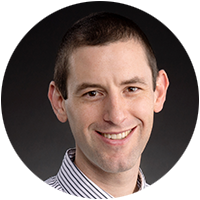Seth Karol, MD | Global Clinical Scholars Research Training

As an experienced pediatric hematologist/oncologist, Seth Karol, MD has been practicing at St. Jude Children’s Research Hospital for nine years. Most of the patients he treats have blood-related cancers, like leukemia and lymphoma. But Karol also has an active research practice in addition to seeing patients.
“My research efforts here focus on two different aspects, including trying to reduce treatment side effects for children with the most common type of cancer called acute lymphoblastic leukemia, or ALL,” he says. The other is to bring new drugs to these patients with the hope of improving treatment responses in some of the hard-to-treat leukemia types.
Already accustomed to running clinical trials, Dr. Karol wanted to learn more. So, in July of 2019, he enrolled in the Global Clinical Scholars Research Training (GCSRT) program, a postgraduate medical education offering from Harvard Medical School. GCSRT uses a blended learning model that incorporates online tools and in-person seminars and workshops, for physicians, researchers, and other health care providers.
“The program piqued my interest because it offered additional training I could use immediately, such as a better understanding of biostatistics, epidemiology, and clinical trials administration and development," he adds.
Mixed Learning Model
Dr. Karol was aware of similar programs for physician scientists like himself that would be useful. But the GCSRT program stood out thanks to recommendations from colleagues and mentors at St. Jude, some of whom had trained in Boston/Cambridge and were familiar with it.
“The aspects of the course that made this the most attractive of the available options was the combination of focused in-person time during the on-campus conferences or seminars combined with the longer-term didactic ongoing education that occurred over the course of the year,” he says. Even when COVID-19 interrupted the third—and final—in-person seminar planned for June 2020, the program successfully pivoted to an online format allowing the group to complete the program in October 2020.
Program Diversity a Plus
Dr. Karol valued the diversity of the participants in his Global Clinical Scholars Research Training cohort. “It not only brought together people from around the world but also from across different parts of medicine,” he says. “It was a great multidisciplinary team.” His own seven-person small group included pharmacists, a research associate in psychosocial research, an adult infectious disease specialist, and an interventional neuroradiology fellow. More broadly, the larger class also included psychologists, physician specialists, and nurses.
“Working with that diverse group really highlighted the unique perspectives we all provide from different aspects of the medical system and what that means for research and how we care for patients,” says Karol. He had already seen firsthand the benefits of a diverse group of care providers taking care of patients because they all have different expertise and ways of identifying problems in patients and helping them get through those problems.
“But in terms of research, it really highlighted the ways in which people from all aspects of the health care field are able to contribute to the research enterprise and contribute ideas that make the research more comprehensive and ultimately more effective,” he adds.
Capstone Project: Building on an Earlier Clinical Trial
During the first part of the program, Karol was involved in the Phase 1/II clinical trial (VENAML) which included a new combination of drugs (cytarabine/venetoclax) for patients with a hard-to-treat type of leukemia called refractory or relapsed AML. Study results published in Lancet Oncology indicated the therapy was encouraging but a larger trial was needed to further refine the understanding of how effective it really was and in what types of patients.
For his capstone project culminating his work in the GCSRT program, Karol proposed a much larger phase II clinical trial involving that combination treatment. As discussions were in process to start the trial, venetoclax’s manufacturer proposed a slightly different venetoclax/AML study design for which Dr. Karol will be the principal investigator in the US.
Pre-Trial Design Organization
Since Dr. Karol was not a novice to clinical trials, he already had some statistical analytical skills. “But the ability to do statistics that I learned from the course enables me to give a first pass before meeting with the team statisticians to a lot of the statistical design that go into the development of a trial,” he says. “When we're talking about the development of a big trial like that—or really any trial—it helps when I first collaborate with a PhD-level statistician and talk through the details of those trial developments.”
Some of those key details include the sample size needed, how many collaborators and testing sites may be required, how long the trial may need to run, or even if the trial is feasible to complete in the first place. “Having those beefed-up statistical skills helped me rethink what we were proposing,” Karol adds.
Team-Building and Leadership Training
“I had the opportunity for really excellent training here at St. Jude and at some other workshops along the way after I became a physician so I felt like I entered this program in a very good place,” says Karol. “That said, I was still able to gain really useful knowledge and skills that I use even to this day, that helped me either design trials or analyze the data that we already have.”
Beyond teaching new skills about how to ‘do’ research, Karol also found the program useful for teaching people how to lead research, build teams, and become effective leaders within their institutions. “It was unexpected but very appreciated,” he adds.
Learn more about Global Clinical Scholars Research Training.
Written by Alice McCarthy